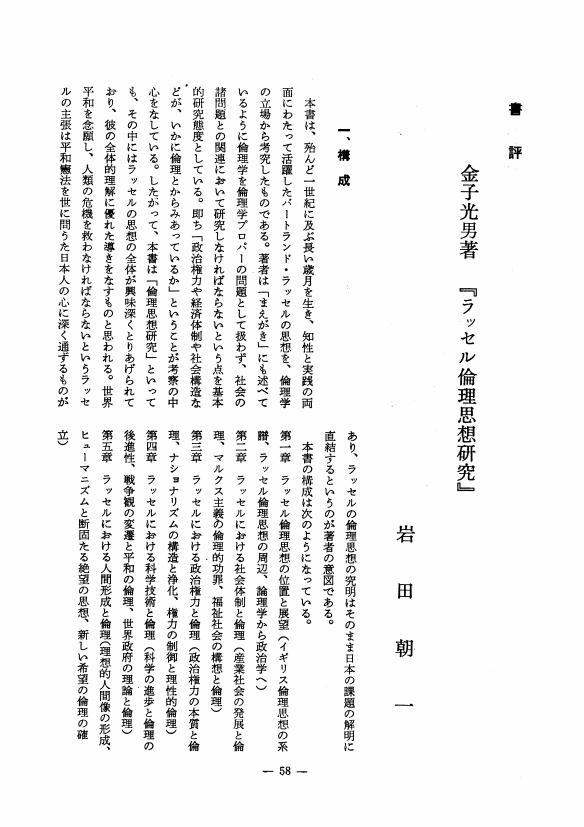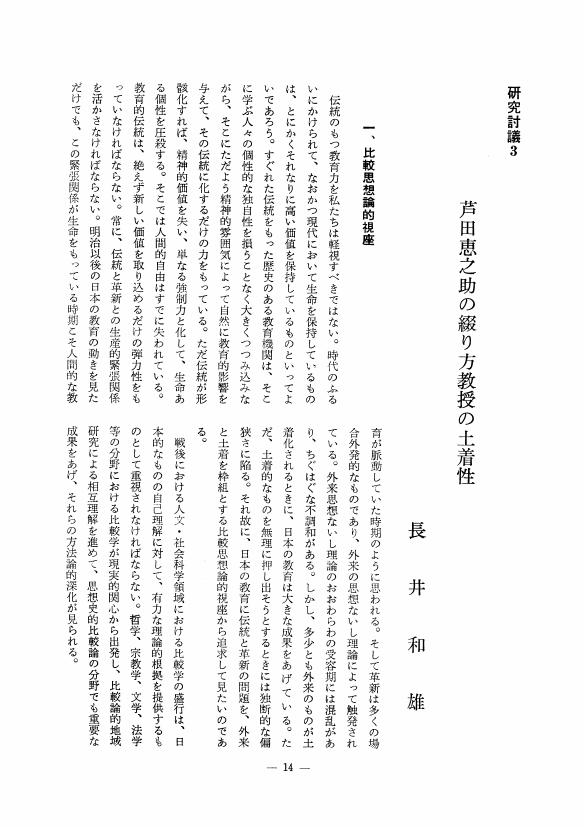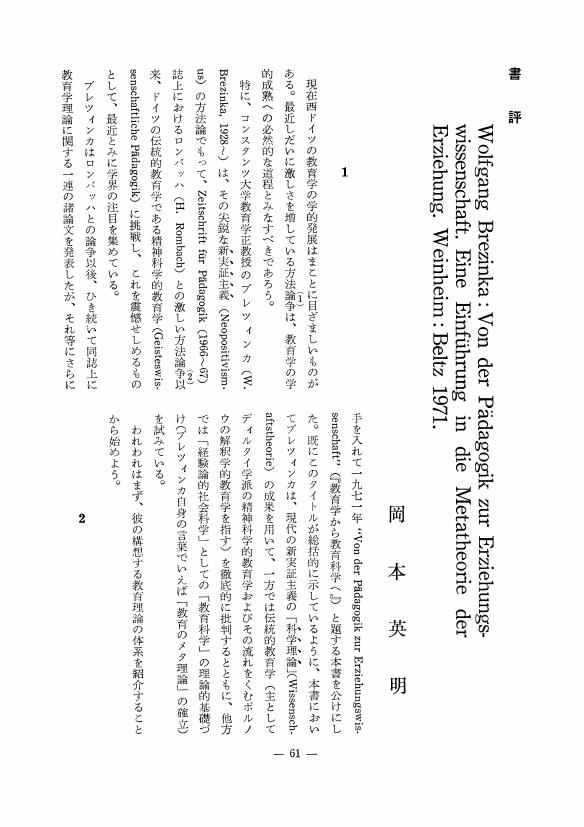1 0 0 0 OA 「教育哲学」のことば
- 著者
- 宇佐美 寛
- 出版者
- 教育哲学会
- 雑誌
- 教育哲学研究 (ISSN:03873153)
- 巻号頁・発行日
- vol.1975, no.32, pp.36-49, 1975-10-10 (Released:2009-09-04)
- 参考文献数
- 5
1 0 0 0 OA ボン大学教育学研究室
- 著者
- 小笠原 道雄
- 出版者
- 教育哲学会
- 雑誌
- 教育哲学研究 (ISSN:03873153)
- 巻号頁・発行日
- vol.1975, no.32, pp.50-55, 1975-10-10 (Released:2009-09-04)
1 0 0 0 OA 一九二〇年代シュプランガーにおける文化教育学思想の特質
- 著者
- 新井 保幸
- 出版者
- 教育哲学会
- 雑誌
- 教育哲学研究 (ISSN:03873153)
- 巻号頁・発行日
- vol.1974, no.30, pp.30-45, 1974 (Released:2009-09-04)
- 参考文献数
- 25
This paper discusses the fundamental pedagogical theory (i. e. the cultural pedagogical thought) of Spranger in the twenties. The theory of cultural pedagogy combines through its copncet of culture the individual viewpoint with the social viewpoint and while contrasting the peculiar nature of education with cultural creativity, determines education as an act of cultural production, as such distinct from mere cultural transmission. In the central theme of the theory of cultural pedagogy formally fixed as mutual interaction of the subjective spirit and the objective spirit, building on the formation theory of neo-humanism, the theory of cultural pedagogy contains the characteristics of the formation theory. The theory of cultural pedagogy which amounts to a revival of the formation theory of neohumanism, while making much of the classical formation theory, carries, above all, at its centre the theme of the self-formation of modern man staying in close contact to the German classical school of thought. The theory of cultural pedagogy with these characteristic features took a critical stand against the debates concerning school reform which stood out clearly in contemporary Germany at that time, and at the same time it was critical also of the generation gap, yet at the same time this theory was occasioned by an attempt to mediate between these two opposites.
1 0 0 0 OA 最近における西ドイツ教育改革の動向 留学の報告にかえて
- 著者
- 天野 正治
- 出版者
- 教育哲学会
- 雑誌
- 教育哲学研究 (ISSN:03873153)
- 巻号頁・発行日
- vol.1974, no.30, pp.46-52, 1974 (Released:2009-09-04)
1 0 0 0 OA 西ドイツのヘルバルト研究
- 著者
- 中森 善治
- 出版者
- 教育哲学会
- 雑誌
- 教育哲学研究 (ISSN:03873153)
- 巻号頁・発行日
- vol.1974, no.30, pp.53-57, 1974 (Released:2009-09-04)
1 0 0 0 OA 金子光男著『ラッセル倫理思想研究』
- 著者
- 岩田 朝一
- 出版者
- 教育哲学会
- 雑誌
- 教育哲学研究 (ISSN:03873153)
- 巻号頁・発行日
- vol.1974, no.30, pp.58-62, 1974 (Released:2009-09-04)
1 0 0 0 OA 篠原助市における教育学形成の特質 欧米教育思想攝取の態度を中心にして
- 著者
- 大浦 猛
- 出版者
- 教育哲学会
- 雑誌
- 教育哲学研究 (ISSN:03873153)
- 巻号頁・発行日
- vol.1975, no.31, pp.1-7, 1975-05-20 (Released:2009-09-04)
- 参考文献数
- 3
1 0 0 0 OA 日本の教育思想の伝統 ヘルバルト教育学の導入を中心として
- 著者
- 是常 正美
- 出版者
- 教育哲学会
- 雑誌
- 教育哲学研究 (ISSN:03873153)
- 巻号頁・発行日
- vol.1975, no.31, pp.8-13, 1975-05-20 (Released:2009-09-04)
吾が国教育思想の伝統を考察するにあたっては、吾が国公教育制度の基本的体制が確立した明治期の教育思想の発展の跡を辿りながら、それの底流にある本質的なるもの乃至永遠なるものを捉らえ来って、それを吾が国教育の現代的状況や未来的展望との関わりにおいて現代化するための歴史的基盤を提示することが、重要な探究課題であると考えられる。ところで明治初年の教育は、周知の如く明治元年の「学舎制」やそれに続く「皇漠学両学所規則」にも明らかなように、漠土・西洋の学を皇道の羽翼とする皇道主義の立場に発する.その後昭和五年の「学事奨勧に関する被仰出書」や「学制」の公布を基礎とし、明治十二年の「日本教育令」においてひとまず完結点に達すると同時に、同十二年の「教学大旨」に発して、皇道主義・儒学主義・洋学主義の葛藤による幾多の迂余曲折を経ながら、明治二十三年の「教育勅語」の制定に至って、明治期教育思想発展の一応の完成点に到達し、その後の発展は、いわゆる「教育勅語教育体制」の充実期となるわけであり、それが終戦後の「教育基本法教育体制」にまで続いていることは言うまでもない。かかる「教育勅語教育体制」の整備充実と明治初年以来の自由民権運動との関わりの問題が、日本教育史上の重要な問題の一つとなっていることは周知の如くであるが、それはここでの問題にはしない。
1 0 0 0 OA 芦田恵之助の綴り方教授の土着性
- 著者
- 長井 和雄
- 出版者
- 教育哲学会
- 雑誌
- 教育哲学研究 (ISSN:03873153)
- 巻号頁・発行日
- vol.1975, no.31, pp.14-19, 1975-05-20 (Released:2009-09-04)
1 0 0 0 OA 教育哲学の課題 現代教育の課題と関連させて
- 著者
- 大浦 猛
- 出版者
- 教育哲学会
- 雑誌
- 教育哲学研究 (ISSN:03873153)
- 巻号頁・発行日
- vol.1974, no.29, pp.6-12, 1974-05-15 (Released:2009-09-04)
1 0 0 0 OA 現代教育哲学の課題
- 著者
- 田浦 武雄
- 出版者
- 教育哲学会
- 雑誌
- 教育哲学研究 (ISSN:03873153)
- 巻号頁・発行日
- vol.1974, no.29, pp.13-19, 1974-05-15 (Released:2010-05-07)
- 参考文献数
- 12
1 0 0 0 OA シュプランガーの内界覚醒論
- 著者
- 岩間 浩
- 出版者
- 教育哲学会
- 雑誌
- 教育哲学研究 (ISSN:03873153)
- 巻号頁・発行日
- vol.1974, no.29, pp.20-38, 1974-05-15 (Released:2010-01-22)
- 参考文献数
- 106
In this paper the principle of the awakening in education is examined which Spranger discussed when he was advanced in age. First, the problem is taken up what precisely has to be awakened in the educand and there as the locus of the personality were identified what has been called the conscience (das Gewissen), the soul (die Seele) and the organ of interior coordination (der innere Regulator). Secondly, the question is asked what characteristics these posess and these characteristics are treated under the following headings : a) the conscience as the ethical layer of the personality ;b) the conscience as the religious and the metaphcial layer of the personality ;c) the pedagogical eros and the conscience.In connection with the latter, the pedagogical eros, the problem of the relation between the pedagogical eros and the theory of awakening is taken up. By comparing Scheler and Bollnow who have some doubts about the existence of such a pedagogical eros, with the theories of Kerschensteiner, Spranger, Flitner and others who pursue some peculiar pedagogical eros, it is made clear that as far as Spranger is concerned, the pedagogical eros forms the central element of his theory of the awakening. Finally, by referring to the fact that in his advanced age he came to believe that the pedagogical eros originates from a metaphysical source, we show that there is a deep connection between this and the origin of his theory of the awakening.
1 0 0 0 OA 実存的自由としての人間
- 著者
- 吉村 文男
- 出版者
- 教育哲学会
- 雑誌
- 教育哲学研究 (ISSN:03873153)
- 巻号頁・発行日
- vol.1974, no.29, pp.39-53, 1974-05-15 (Released:2010-01-22)
- 参考文献数
- 26
この小論は、ヤスパースにおいて人間がいかにとらえられているかということを、実存的自由を中心として解明しょうとしている。ところで、ある哲学者、思想家において人間がいかに理解されているかという問題は、人間存在を哲学の対象とする哲学的人間学との関係とかかわらざるをえない。しかし、そうした哲学的人間学との関連という問題はこの小論の範囲をこえている。さらに、この小論が取り上げるヤスパースの哲学における人間理解という問題の背後には、もちろん、彼の哲学思想をわがものとすることによってそれを根底として教育人間学を構想とするという意図が秘んでいる。しかし、この小論は、そこまでの具体化をさらに将来の問題として残している。ただ、最後に論じられる職業の選択ということのうちには、教育人間学への具体化の一つの手掛りが存しているであろう。以上のような意図のもとに、ヤスパースにおいて人間はいかにとらえられているかに問題を限定して論じてみたい。
1 0 0 0 OA 現代フランス教育学研究の動向と展望
- 著者
- 石堂 常代
- 出版者
- 教育哲学会
- 雑誌
- 教育哲学研究 (ISSN:03873153)
- 巻号頁・発行日
- vol.1974, no.29, pp.54-60, 1974-05-15 (Released:2010-01-22)
- 参考文献数
- 25
「諸科学の教育科学への寄与」という多面的かつ総合的なテーマを掲げて開催された国際教育研究推進協会International association for the advancement of educational researchパリ会議 (一九七三・九・三~七) は、大半の参加者が仏語圏研究者であった理由から、現代フランス教育学研究の動向を知るにも好個の機会であった。フランスの教育学研究については以前よりその傾向の益々科学的なることに注目していたが、ここでその判断を再確認すると共に、其の後の見聞を通して一つの概観を得たように思われるので、教育哲学研究の今後のあり方を考えるという意味を含めて、ここに総括してみたい。
- 著者
- 岡本 英明
- 出版者
- The Japanese Society for the Philosophy of Education
- 雑誌
- 教育哲学研究 (ISSN:03873153)
- 巻号頁・発行日
- vol.1974, no.29, pp.61-67, 1974-05-15 (Released:2010-05-07)
- 参考文献数
- 17
- 著者
- 斎藤 勉
- 出版者
- The Japanese Society for the Philosophy of Education
- 雑誌
- 教育哲学研究 (ISSN:03873153)
- 巻号頁・発行日
- vol.1974, no.29, pp.68-72, 1974-05-15 (Released:2009-09-04)
1 0 0 0 OA トマス・ジェファソンの教育思想におけるデモクラシーの概念
- 著者
- 山口 恒夫
- 出版者
- 教育哲学会
- 雑誌
- 教育哲学研究 (ISSN:03873153)
- 巻号頁・発行日
- vol.1974, no.30, pp.1-15, 1974 (Released:2009-09-04)
- 参考文献数
- 58
The concept of “democracy” which was inherent in the republicanism of Thonas Jefferson (1743-1826) at the time of independence and most of all in his educational thought, had at its basis a strong belief in “reason” and “morality” of man who possesses the right of “self-government” as a natural right, and it included originally some kind of moral meaning.According to Jefferson the function of public education was to cultivate “reason” and “moral sense”, universal faculties and endowments peculiar to man, and thus to improve the capability of man for self-government. It consisted on the one hand of elementary ebucation with the purpose of making autonomous personalities out of the people by fostering their autonomous judgment through spreading widely knowledge and the art of reading and writing ; on the other hand it consisted of secondary and higher education with the purpose of training trustworthy leaders ; students with a high degree of morality and intellectual capacity were to be chosen for this level and educated at public expense. The creative element in this educational theory of Jefferson consists in the fact that that he visualized education in connection with political and social problems, developing the human right of self-government and laying the foundations for it by creating the corresponding capacity.
1 0 0 0 OA カント『教育学』における「批判」的方法
- 著者
- 俵木 浩太郎
- 出版者
- 教育哲学会
- 雑誌
- 教育哲学研究 (ISSN:03873153)
- 巻号頁・発行日
- vol.1974, no.30, pp.16-29, 1974 (Released:2009-09-04)
- 参考文献数
- 33
There are theories attempting to interpret Kant's “Pedagogy” as a product of his enlightenment philosophy trying to separate it from his critical philosophy (e. g. Sukeichi Shinohara, “Oshu Kyoiku Tetsugakushi” (History of Western Educational Thought)). The contention of this paper sustained by an examination of the principle of the twofold division which Kant adopted in his “Pedagogy” is that this is not different from the 'critical' method. In this process of examination the author considers as the methodological principles of 'criticism' the following three points : 1. The articulation structure of the dialectic pure reason- “Pure Reason” 2. The analysis and synthesis in the judgment- “Pure Reason” 3. The method of an analytical twofold division and the method of a threefold synthetic division- “Critique of Judgment” In addition, as a prerequistite condition for the possibility of such an examination, we shall refer to the maxims of Kant's use of words and to his circumspection in the application of educational terminology.The method of a twofold partition of the positive and the negative, the condition of a twofold analytical division into the natural and the practical and the method of the threefold division in moral education are discussed and we finally arrive at what may be called a fourfold division. When it comes to this point, no formal possibility can brought out, no matter how well Kant's morality is explained and an educational principle in the world of experience cannot be deduced thence, rather the foundation must be sought in common sense, -that is what we maintain. The main theme of this paper is an attempt to discover a 'critical' aspect in “Pedagogy” through a negative approach to this morality.
1 0 0 0 OA カントの人間学の構造 教育の立場からの一考察
- 著者
- 鈴木 志乃恵
- 出版者
- 教育哲学会
- 雑誌
- 教育哲学研究 (ISSN:03873153)
- 巻号頁・発行日
- vol.1973, no.28, pp.26-42, 1973-11-15 (Released:2010-01-22)
- 参考文献数
- 52
What is man - this question of anthropology is by no means an arbitrary or aimless one directed toward man, but since it is the fundamental and primary question, the author pursuing this problem by relying on Kant's philosophy intends to clarify somewhat further which problem lies at the basis of this question or must be studied necessarily in connection with it. If Kant's entire philosophy istaken for anthropology, two different kinds of anthropology can be distinguished, one belonging to the field of experience and the other one to the transcendental realm. By studying the structure of Kant's anthropology, the author intended to clarify the foundations of the origin of both types of anthropology and their mutual relationship. It is intended furthermore, to clarify the meaning of Kant's work Anthropology under a Practical Viewpoint, and the basis of Kant's view on education. Kant does not discuss anthropology as a mere instrument of pedagogy, but in his philosophy the possibility of education originates only at the moment when the foundation of a possibility of anthropology emerges. Hence, the study of anthropology was considered necessary to understand Kant's pedagogy.
1 0 0 0 OA 米国におけるモンテッソーリ・リバイバル
- 著者
- 清水 貞夫
- 出版者
- 教育哲学会
- 雑誌
- 教育哲学研究 (ISSN:03873153)
- 巻号頁・発行日
- vol.1973, no.28, pp.43-48, 1973-11-15 (Released:2009-09-04)
- 参考文献数
- 13











